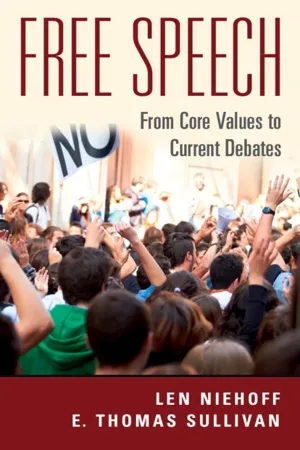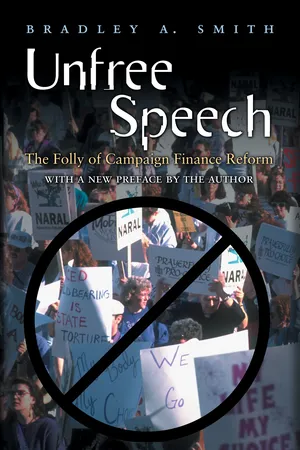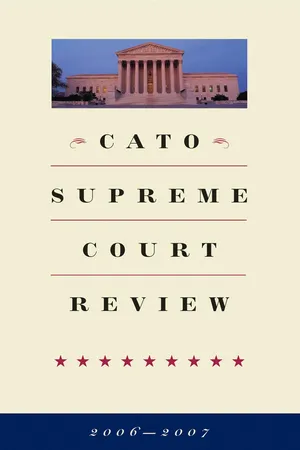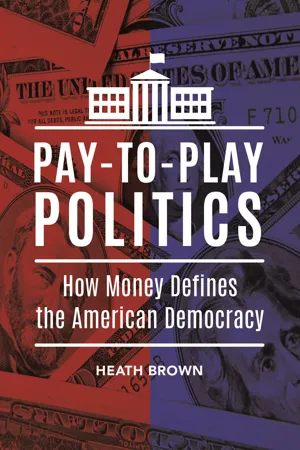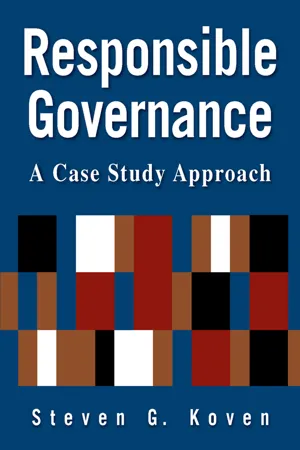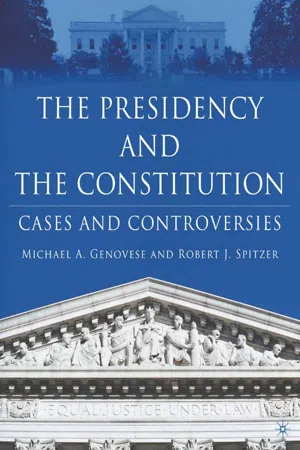Politics & International Relations
Buckley v. Valeo
"Buckley v. Valeo" was a landmark 1976 Supreme Court case that upheld limits on campaign contributions but struck down limits on campaign spending. The case also established the principle that spending money on political campaigns is a form of protected free speech under the First Amendment. This decision has had a significant impact on campaign finance laws and regulations in the United States.
Written by Perlego with AI-assistance
Related key terms
1 of 5
9 Key excerpts on "Buckley v. Valeo"
- eBook - PDF
Free Speech
From Core Values to Current Debates
- Len Niehoff, E. Thomas Sullivan(Authors)
- 2022(Publication Date)
- Cambridge University Press(Publisher)
20 But, as Buckley demonstrates, that framework proved to be more enduring as a model for free speech jurisprudence than it did in other areas of constitutional law. And, in the area of campaign finance as elsewhere in First Amendment doctrine, the model of a free market prevailed and dominated. Buckley thus enshrined three critical principles of campaign finance jurispru- dence. First, campaign spending is protected speech. Second, campaign contribu- tions raise concerns that general political expenditures do not. And, third, those concerns relate to actual and apparent corruption. The fact that massive expend- itures can distort the political process, marginalize voices and perspectives, and frustrate the search for the truth and for the best policies was not viewed as a consideration. Despite the manifest disconnection between this doctrine and polit- ical reality, it attracted the five-justice majority necessary for the opinion. 16 Id. at 49 (quotes omitted). 17 The abandonment of an equalizing interest has been controversial, ruling out the potentially most coherent theory supporting upper limits on campaign finance spending. See, e.g., Marlene Arnold Nicholson, Buckley v. Valeo: The Constitutionality of the Federal Election Campaign Act Amendments of 1974, 1977 Wis. L.Rev. 323, 336 (1977). 18 Buckley, 424 U.S. at 57. 19 Named for the Court’s decision in Lochner v. New York, 198 U.S. 45, 61 (1905). 20 West Coast Hotel Co. v. Parish, 300 U.S. 379 (1937) (overruling Lochner v. New York, 198 U.S. 45 (1905)). Campaign Finance Regulation 163 For our purposes, the next major development came just two years after Buckley, in First National Bank of Boston v. Bellotti. 21 In that case, the Supreme Court held that corporations have First Amendment rights, including to make contributions to ballot initiative campaigns. The Court therefore struck down a Massachusetts law that prohibited corporate donations to ballot initiatives under certain circumstances. - eBook - ePub
Selling Out
How Big Corporate Money Buys Elections, Rams Through Legislation, and Betrays Our Democracy
- Mark Green(Author)
- 2013(Publication Date)
- Avon(Publisher)
RULES AND LAWS How Money Shouts “Politics has got so expensive that it takes a lot of money to even get beat with.” —Will Rogers, 1931 “[ Buckley is] one of the most weakly reasoned, poorly written, initially contradictory court opinions I’ve ever read.” —Senator and former federal district court judge George Mitchell (D–ME), 1990 “You’re more likely to see Elvis again than to see [McCain-Feingold] pass the Senate.” —Senator Mitch McConnell (R–KY), 1999 Buckley Rules Along with the essential regulations on contributions, expenditures, and disclosure, the 1974 FECA amendments included a provision, written by Conservative New York senator James L. Buckley, that gave private citizens the right to challenge the constitutionality of the law in court. On January 2, 1975, the first business day after the 1974 amendments went into effect, a bizarre coalition of plaintiffs including Buckley, former Senator Eugene McCarthy, and liberal philanthropist Stewart Mott raced to the federal courthouse in Washington to file what would be called Buckley v. Valeo, the decision that defined campaign finance rules in the last quarter of the twentieth century. James L. Buckley is the younger brother of famous conservative William, who founded the magazine National Review. In 1970, James ran on the Conservative Party ticket in New York and was elected to the Senate by a plurality of the vote, outflanking Republican incumbent Charles Goodell and Democratic Representative Richard Ottinger. Buckley, who is now a federal judge, said he “depended on a few people” to finance his senatorial bid; had two creditors of $50,000 and $15,000; and received a $100,000 contribution on the condition that he would repay his benefactor if he won - eBook - ePub
Deciding Communication Law
Key Cases in Context
- Susan Dente Ross(Author)
- 2004(Publication Date)
- Routledge(Publisher)
6 campaigning, access to the ballot, political advertising and the role of the media in the broad exchange of political information. Thus, government restrictions on political speech must pass the most exacting strict scrutiny. Yet the fundamental rights of political involvement and selfgovernance sometimes give way to compelling state interests in avoiding political corruption or coercion of voters. In recent years, for example, the Court has been asked to consider the constitutionality of federal and state campaign finance reforms, FCC political broadcasting requirements, and statutory restrictions on candidate speech.CAMPAIGN FINANCE RESTRICTIONS
For more than a quarter century, the Supreme Court has attempted to apply its ruling in Buckley υ. Valeo7 to establish clear, predictable standards for constitutionally acceptable limits on campaign finance. However, some observers say Buckley’s “political compromise” has failed to achieve anything “even approaching a coherent jurisprudence” in this area.8In Buckley, the Court acknowledged the critical importance and interconnection of funding and political speech. The Court, however, distinguished between campaign expenditures and campaign contributions, viewing the first as related to the personal expressive rights of candidates or other individuals and the second as tied to contributors’ speech. Based on that dichotomy, the Court’s per curiam - eBook - ePub
Unfree Speech
The Folly of Campaign Finance Reform
- Samantha Sellinger(Author)
- 2009(Publication Date)
- Princeton University Press(Publisher)
Chapter 7MONEY AND CORRUPTIONThe Supreme Court held in Buckley v. Valeo that the government interest in preventing “corruption” or the “appearance of corruption” was sufficiently compelling to uphold some campaign finance regulation against First Amendment challenge. Specifically, the Court upheld requirements for the disclosure of contributions,and for limits on contributions, though it struck down mandatory limits on spending of all kinds.1 As we have seen in chapters 3 and 4, the idea that money is uniquely or particularly “corrupting” in the political process is open to both theoretical and empirical attack,the Court’s ruling notwithstanding. In this chapter,we shall see that the Court’s decision to uphold limits on political contributions in order to prevent “corruption” or the “appearance of corruption” is also vulnerable on constitutional grounds.We begin by reminding ourselves that “corruption,” as the term is used in Buckley and in the world of campaign finance,does not mean the misuse of funds for personal gain,or bribery,or other acts that are illegal apart from campaign finance laws. Rather,“corruption” in the lexicon of campaign finance reform means the overt or implicit exchange of legislative votes in return for campaign contributions; or,more subtly, the determination of a legislative agenda on the basis of contributions; or,in some cases,even the mere “appearance of corruption.”2 In its most refined form,it has come to mean little more than actual or apparent conflict of interest.Buckley allowed that “corruption” and the “appearance of corruption” were sufficient governmental interests to justify some restraints on political contributions,but not on expenditures. In doing so,the Buckley Court appeared to define corruption narrowly to mean quid-pro-quo exchanges in which large contributions are given to assure a political vote or favor. In the Court’s language,“T o the extent that large contributions are given to secure a political quid pro quo from current and potential office holders,the integrity of our system of representative democracy is undermined.”3 - eBook - PDF
Democracy by the People
Reforming Campaign Finance in America
- Eugene D. Mazo, Timothy K. Kuhner(Authors)
- 2018(Publication Date)
- Cambridge University Press(Publisher)
II. Equality and Participation in U.S. Election Law A. Political Equality and Campaign Finance Regulation Although at one time the U.S. Supreme Court’s election law jurisprudence had a better balance between libertarian and egalitarian themes, the Court has in recent years increasingly adopted a libertarian approach to the regula- tion of campaign finance. In its first campaign finance case, Buckley v. Valeo, 4 the Court expressly rejected the egalitarian approach, declaring that the “the concept that government may restrict the speech of some elements of our society in order to enhance the relative voice of others is wholly foreign to the First Amendment.” 5 Although the Court upheld the constitutionality of con- tribution limits in Buckley, its rationale was that such restrictions were needed to prevent the reality and appearance of corruption. 6 The Court struck down the restrictions on spending on the basis that these limits consisted of direct restraints on speech in violation of the First Amendment. 7 In later decisions, however, the Court’s anti-corruption rationale transformed into something close to an equalization rationale. 8 Although the Court did not openly embrace the equalization rationale, the meaning of corruption had broadened (for at least some of the justices) into a commitment to “anti-distortion,” which overlapped in significant ways with the equalization 4 Buckley v. Valeo, 424 U.S. 1 (1976). 5 Id. at 48–49. 6 Id. at 26–27. For an analysis of the concept of corruption, see Zephyr Teachout, Corruption in America: From Benjamin Franklin’s Snuff Box to CITIZENS UNITED (2014). 7 Buckley, 424 U.S. at 19–20. 8 Kathleen M. Sullivan, Political Money and Freedom of Speech, 30 U.C. Davis L. Rev. 663, 679 (1997). Equal Participation and Campaign Finance 429 4 2 9 rationale. - eBook - ePub
- Mark K. Moller(Author)
- 2007(Publication Date)
- Cato Institute(Publisher)
Redux: Buckley v. Valeo to FEC v. Wisconsin Right to LifeLillian R. BeVier*In 2002, hard on the heels of the Enron debacle, Congress passed and President Bush signed the Bipartisan Campaign Finance Reform Act (BCRA, or McCain-Feingold).1 The Act imposed extensive new regulations on and restrictions of campaign finance practices. Its two most notorious titles were Title I, which prohibited so-called soft-money contributions to national political parties,2 and Title II, which prohibited corporations and unions from making independent expenditures from their general treasury funds to broadcast “electioneering communications”—communications that mention candidates for federal office by name within thirty days of a primary or sixty days of a general election.3 Profound differences of opinion existed about the wisdom and the likely effects of BCRA, and its constitutionality was always in doubt.4 Indeed, conventional wisdom has it that President Bush signed the legislation only because he was convinced that the courts would invalidate it.5 The electioneering communications prohibition was thought to be particularly vulnerable to First Amendment challenge. In a 329-page set of opinions, however, rendered after taking volumes of testimony, a divided three-judge district court sustained the Act almost in its entirety.6 A majority of the Supreme Court affirmed in an opinion with respect to Titles I and II that was co-authored by Justices John Paul Stevens and Sandra Day O’Connor and joined by Justices David Souter, Ruth Bader Ginsburg, and Stephen Breyer.7Champions of campaign finance regulation understandably regarded McConnell as a “stunning triumph,”8 and not merely because of the result. Although its reasoning has been called “unusually sloppy and incoherent” even by stalwart supporters of regulation,9 the majority opinion in McConnell was clear about one vitally important fact: it was an unambiguous rejection of the view that at the First Amendment’s core is the principle of free political speech. Indeed, the majority in McConnell was quite plainly disheartened by what became of politics when free political speech was the universal baseline. Thus, it paid “only cursory attention to the First Amendment interests” at stake.10 At the same time, the majority exhibited no skepticism about the possibility either that the legislators who passed BCRA might have had malign self-protective motives or that BCRA might produce anything other than benign results.11 McConnell did not purport to overrule Buckley v. Valeo,12 the Court’s seminal campaign finance regulation case, but it did turna very cold shoulder indeed to the First Amendment premises that had provided the touchstone of Buckley’s analysis (if not, perhaps, all of its holdings).13 In Federal Election Commission v. Wisconsin Right to Life, Inc. (WRTL II - eBook - PDF
Pay-to-Play Politics
How Money Defines the American Democracy
- Heath Brown(Author)
- 2016(Publication Date)
- Praeger(Publisher)
These special words have become a central feature of the debates about regulating campaign finance since the Buckley decision. In practice, then, the Court permitted nearly limitless independent expen- ditures to be used to say almost anything about a campaign, as long as the communication did not expressly advocate for or against the election of an individual. 60 Pay-to-Play Politics To review, the Buckley ruling stands out and remains as a seminal part of the history of money and politics in the United States. The Court estab- lished that federal oversight of elections was permissible, but only limits on campaign contributions were constitutional as a basis to protect the public from corruption (or perceived corruption); limits on campaign expendi- tures were not. In the case of expenditures, the Court adopted the view that the First Amendment and the principle of free speech protected an individual or organization’s spending on a campaign. To limit an individu- al’s expenditures was tantamount to unconstitutionally limiting their free speech, which is justified only if it protected against direct threats of corrup- tion. As well, the Court accepted other provisions of FECA that remained in various forms for the next 40 years, including disclosure requirements, the FEC, and a publicly financed fund to support presidential candidates. 2002 Regulation: BCRA In the 1990s, the next round of concern for campaign finance emerged, and a new round of federal policy making commenced. One of the reasons for these concerns was what Paul S. Herrnson called the political “adaptation” to the law as “political parties, interest groups, individual donors, and congressional candidates learned to operate within its confines.” 50 It was perfectly legal for political parties to raise and spend what is called soft money or money used for issue advocacy and other party-related expenses not directly associated with campaigns. - eBook - ePub
Responsible Governance: A Case Study Approach
A Case Study Approach
- Steven G. Koven(Author)
- 2014(Publication Date)
- Routledge(Publisher)
Table 3.2 .Not unexpectedly, the 1974 bill was challenged in the courts almost immediately. In a 1976 Supreme Court case (Buckley v. Valeo , 424 U.S. 1), the court struck down limits on campaign spending, limits on independent expenditures, and limits on contributions by a candidate to his or her own campaign. The Court ruled that spending limits violated the First Amendment, reasoning that restricting the amount of money a person or group can spend on political communication reduces the quantity of expression, restricts the number of issues raised, limits the size of the audience reached, and constrains the depth of explanation. The Supreme Court upheld disclosure requirements, public financing, and limits on contributions from individuals, PACs, and political parties (Malbin 1984a, 8). A ceiling remained on spending for presidential candidates who accepted federal matching funds.Both supporters of reform and supporters of the status quo favored some aspects of the Supreme Court decision. Reformers praised the limitations on individual contributions. Those advocating unlimited spending applauded the court’s action that struck down as unconstitutional the limits on campaign expenditures. - eBook - PDF
The Presidency and the Constitution
Cases and Controversies
- M. Genovese, R. Spitzer(Authors)
- 2005(Publication Date)
- Palgrave Macmillan(Publisher)
Bush won; we also know that it was the U.S. Supreme Court that ultimately handed him the presidency. In the end, Bush became president in one of the closest elections in presidential history. How did it come to pass that the United States Supreme Court selected the president of the United States? What rules and laws apply to the selection/election of presidents? How much guidance does the Constitution give? Few public issues in the United States escape judicial scru- tiny. If the integrity of our democracy is to be maintained, the “process” must be above politics. But can it ever be truly above or apart from politics? Politics has always had its slimy side, and often money has played a key role in questions of political corruption. Over time, Congress has attempted to control the flow of money into the political process, but with little success. One such effort, the Federal Election Campaign Act of 1971, with its 1974 amendments, sought to limit political contributions and to limit expenditures, and called for timely reporting of contributions. The act was challenged on a variety of grounds, but the “free speech” question quickly came to center stage in this per curiam opinion. CHAPTER 4 Selection/Election Buckley v. Valeo 424 U.S. 1 (1976) . . . B. The Merits Appellants urge that since Congress has given the Commission wide-ranging rulemaking and enforce- ment powers with respect to the substantive provi- sions of the Act, Congress is precluded under the principle of separation of powers from vesting in itself the authority to appoint those who will exer- cise such authority. Their argument is based on the language of Art. II, 2, cl. 2, of the Constitution . . . Appellants’ argument is that this provision is the exclusive method by which those charged with executing the laws of the United States may be chosen .
Index pages curate the most relevant extracts from our library of academic textbooks. They’ve been created using an in-house natural language model (NLM), each adding context and meaning to key research topics.
